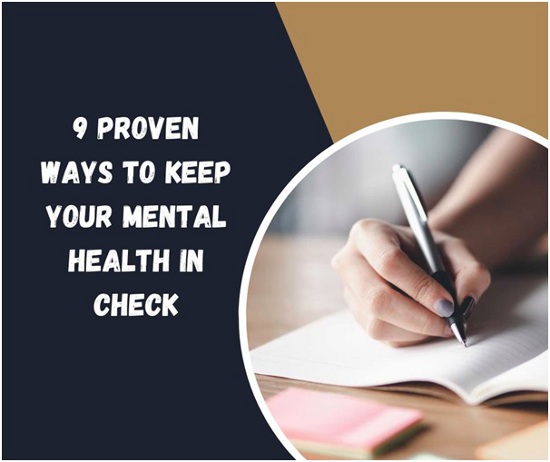When it comes to our mental health, we often fail to realize that we have the ability to keep things in check. Sure, there are times when we’re feeling good and happy and things are going well. But sometimes—especially when dealing with depression or anxiety—the situation can get a bit more complicated.


It’s no secret that mental health is important. But when you’re going through a tough time, it can be hard to know what to do or how to keep your mental health in check. With all the stressors of everyday life, it’s easy to lose sight of what makes us feel good and happy.
We know how hard it can be to maintain a positive outlook when life gets tough. Even searching for a simple solution like Someone Can Do my Assignment online seems daunting and impossible to complete.
Luckily, there are many things you can do to keep your mental health in check—and even make it better! To help you out, we’ve got some tips for you in this blog—and we hope they help!
How To Keep Your Mental Health In Check?
If you want to take better care of yourself emotionally and mentally, try these nine proven ways to keep your mental health in check:
1. Work Out Regularly
Exercise is a great way to keep your mind and body healthy. It also helps you sleep better, reduce stress and improve your mood. If you don’t work out regularly, this is a good time to start! Try taking walks around the neighbourhood, playing sports, hitting the gym or doing yoga each day.
When starting an exercise program for the first time, consistency is key! If you miss one day or skip an entire week then chances are pretty good that those days will end up turning into months (or years). So make sure to commit yourself fully before moving forward with any plan. If it means doing something twice per week instead of once then so be it!
2. Have A Routine
You may have heard the saying “a routine is a key to success.” It’s true!
Routine gives you structure and predictability, which helps you feel less stressed out and more relaxed. When you have a consistent routine, it also gives your mind something new to focus on every day—and that can help reduce anxiety or depression symptoms as well!
Have one consistent time to wake up in the morning, leave for work, get home from work, and eat dinner every day. This will help you stay on track with your schedule and make it easier to remember the important things in life.
3. Maintain A Healthy Diet
You may have heard that eating a good diet and exercising are the key to mental health. But it’s not just about food, according to new research, people with a healthy lifestyle had better mental health than those who don’t.
Here are some tips for maintaining a healthy diet:
- Eat plenty of fruits and vegetables. The antioxidants found in these foods help reduce inflammation and boost your mood, while also protecting against heart disease, diabetes and cancer. You should aim for eating at least two different fruits every day!
- Eat whole grains instead of processed foods like white bread, pasta or cereal (which can contain added sugar). This will provide you with more fibre which helps improve digestion. Plus there’s less fat in whole grain products than in refined versions.
- Get some vitamin D from sunlight (which helps with depression). If this isn’t possible for whatever reason—like if it’s winter—you can get vitamin D from foods like eggs, salmon and tuna fish.
4. Practice Meditation
Meditation is a proven way to keep your mental health in check. It’s a great way to quiet your mind and focus on the present moment. It can help you with anxiety, stress, and depression by helping you regulate your emotions.
Meditation has also been known to improve sleep quality, and reduce heart rate variability—which can make you feel more relaxed overall! So practice meditation daily or at least 3 times a week to keep your mental health in check.
5. Get The Right Amount Of Sleep
To keep your mental health in check, it’s important to get the right amount of sleep. According to the National Sleep Foundation (NSF), adults should get 7-9 hours of sleep every night.
Sleep is important for mental health because it helps your body recover from stress and clears away toxins. It also boosts memory and brain function by clearing out temporary memories that build up over time, which are then replaced by new ones when we wake up in the morning after getting a good night’s rest.
If you’re not getting enough sleep, it can make you feel tired and stressed out more often, which can lead to poor performance at work or school. So limit the time you spend on social media, TV shows, movies, and playing video games). This will help keep your mind off of things that make it hard for you to sleep at night.
6. Connect With Others In Person
Talking to people face-to-face is important for your mental health. In this world full of stress and anxiety, it can be easy to forget that we’re not just here for ourselves. We’re here for each other—and for our community. As we’ve seen over the past few years, social media has made it easy for us to feel isolated and alone.
But don’t worry! It’s not too late to start reconnecting with friends and family, even if you live far away from them. There are plenty of online resources that can help you stay connected with people who matter most to you!
7. Take A Break From Social Media
Social media can be an incredible outlet for creativity and self-expression, but it also has its drawbacks. It can cause us to compare ourselves unfavourably to others who seem happier than we do, which can lead us down a dark path of self-doubt and anxiety about our lives and careers.
So instead of scrolling through pictures of other people’s lives (or watching videos where someone talks about how much they love their job), take a break from social media for an hour every day—no matter what time of day it is! It’ll make a huge difference in your mood and ability to focus.
8. Seek Help When Needed
When you need help, don’t be afraid to reach out. There are many resources available for people who feel like they can’t cope with their mental health issues on their own. You can talk with someone who cares about you—your friends and family members are always willing to listen when you need them most!
Don’t be ashamed of your feelings. Everyone has good and bad days, but sometimes those feelings can be overwhelming and cause us to question our sanity. If you’re feeling overwhelmed by your mental state, talk with someone close—a friend or family member might have some insight into why this is happening or how they can help stop it from happening again.
If talking isn’t enough for you or if something just doesn’t feel right in your head (if you find yourself experiencing extreme anxiety), don’t hesitate to call up your doctor and ask for an appointment.
It can be hard to talk about your feelings, but it’s worth it in the end. You’ll feel better by sharing your concerns with others and getting support from those who care about you.
9. Try To Reduce Stress
We all have days where we feel overwhelmed, exhausted, or just plain sad. But too much stress can lead to mental health issues, such as anxiety and depression. The good news is that there are many ways to manage your daily stress levels and reduce their effects on your mental health.
In order to manage your daily stress levels effectively, it’s important to take into account all possible sources of stress in your life: work-related issues, family dynamics and relationships with others. It’s also important to find out what triggers your stress. Whatever the issue is, try to figure it out and then eliminate it from your life!
Plus, take a walk outside every day (even if it’s just 5 minutes). Do something fun with friends or family every week. This could be anything from going on a hike together or getting manicures together—whatever makes you feel energized and happy. And don’t forget the post-trip nap!
A Few Simple Lifestyle Changes Can Make A Huge Difference For Your Mental Health!
There are many ways to improve your mental health, but it’s important to be proactive about it. You may be surprised by how much of a difference it can make for you if you take just a few minutes each day and make some simple lifestyle changes.
It’s also important not to wait until you’re in crisis before seeking help. If something feels wrong, don’t ignore it! Seek out professional help right away if necessary. It could save your life or prevent further damage from occurring later in life.









